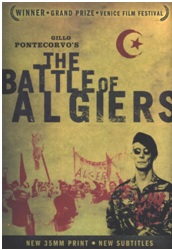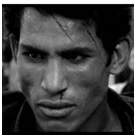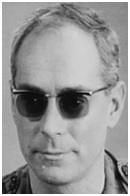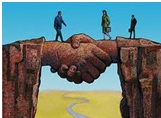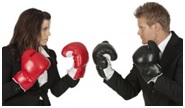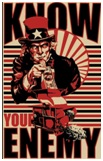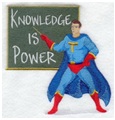|
 |
|
 |
|
|
||
The Battle of Algiers - Strategy and Terrorism
The Battle of Algiers (1966)
Famous for...
Based on... The Battle of Algiers (the capital of Algeria, then a French colony) from November 1954 to December 1960 This happened during the Algerian War (1954-62) in which the native (Arab) Algerians fought the French for independence. The Algerians were led by the terrorist group, the National Liberation Front or Front de Libération Nationale, FLN - its logo is pictured right.
Who won the battle? The French army but its brutality increased the FLN's desire for independence There were heavy casualties on both sides (over 300,000 for the FLN and 90,000 for the French).
Director Gillo Pontecorvo
Oscars None Key characters Ali La Pointe (Brahim Haggiag), petty criminal and FLN recruit. Lahadi Jaffer (Saadi Yacef, pictured right), FLN military commander – the character was based on Yacef himself, one of FLN’s leaders. Lieutenant Colonel Mathieu (Jean Martin), French paratrooper.
The story Ali La Pointe (a peasant and petty criminal, pictured right):
The French bomb the Kasbah (where the native Arab Algerians live) In retaliation, female Algerian bombers kill and maim innocent French women and children. The French government responds by sending to Algiers a paratrooper division, led by Lieutenant Colonel
Mathieu (pictured right below). The war escalates with bombings and killings on both sides, and the FNL organizes an eight day peaceful general strike in an attempt to win the support of world opinion and the United Nations. A racecourse is bombed, killing many French people. Mathieu:
Ali La Pointe is blown up because of information given by a tortured Algerian (whose interrogation was shown at the start of the film). There is then relative calm for two years until 1960 when civil unrest flares up again. After two years of further fighting, the FNL wins Algerian independence from France on 2nd July 1962.
Lessons for strategy and terrorism 1. Consent is crucial The French alienated native Algerians by trying to impose colonial rule on them. This made it impossible for them to rule Algeria, because they lost people’s support. Mathieu’s military success (helped by torture) only causes further discontent and finally independence. The French wrongly believed that the FNL only had minority support. 2. Different objectives lead to conflict War was inevitable between the French and the FLN, because:
3. War is horrific The war escalated, fuelled by:
The FNL leader, Ben M’Hidi commented that women with bombs in their baskets were equivalent to French military action. “Give me the bombers [the French] and you can have the baskets”, M'Hidi says. 4. Know your enemy Mathieu’s aim is to identify and destroy the enemy. But he can’t easily identify the enemy, because the FNL works in cells of three people who don’t know anybody else in the organization.
5. Information is
vital Mathieu realizes that information can defeat the FNL, so he controversially supports the use of torture in interrogation.
Key quotes on strategy and terrorism It’s hard to start a revolution, even harder to continue it and hardest of all to win it, Ben M’Hidi. You don’t win wars with outrages, Ben M’Hidi (on the importance of non-violent action). The basis of our job is information, Lieutenant Colonel Mathieu.
Two film websites to recommend 1. filmsite.org (run by Tim Dirks). 2. aveleyman.com (run by Tony Sullivan)
|
|
|
||
|
|
||
| Copyright © wisdomtowin.com 2025 All Rights Reserved | ||
|


